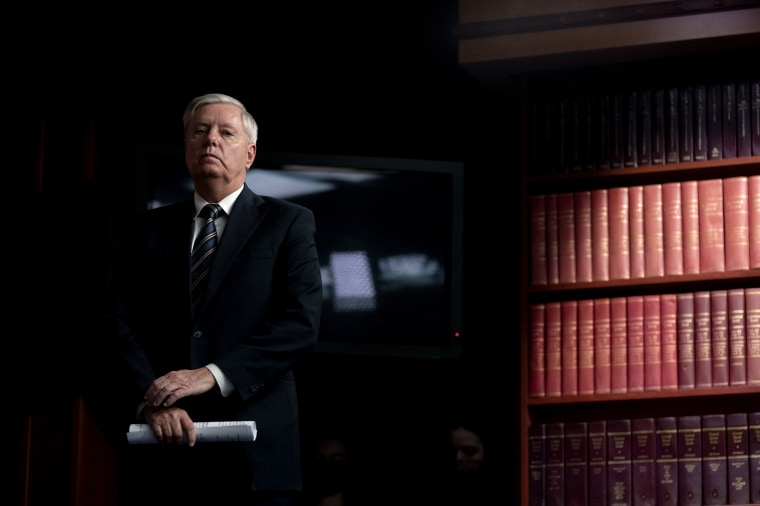WASHINGTON — A Georgia prosecutor on Thursday urged the Supreme Court not to block a requirement that Sen. Lindsey Graham, R-S.C., testify in an investigation into whether former President Donald Trump and his allies tried to interfere in the 2020 election.
Fulton County District Attorney Fani Willis said in court papers that Graham had failed to persuasively argue that limited questioning by a grand jury would violate the Constitution's speech or debate clause, which protects lawmakers from investigations over comments they make as part of their official duties.
Last week, the Atlanta-based 11th U.S. Circuit Court of Appeals rejected Graham’s attempt to avoid answering questions about phone calls he made to Georgia election officials after the 2020 election. Graham has said he made the calls as part of his duties leading up to Congress’ vote to certify the election results; as a result, he argues in an emergency application filed at the Supreme Court last week, a subpoena from a Fulton County special grand jury infringed upon the speech or debate clause.
"Should the senator's application be granted, the grand jury's work will be delayed indefinitely, ensuring that information that could either clear the innocent of suspicion or increase scrutiny on the guilty will continue to lie beyond the grand jury's grasp," Willis wrote.
She noted that under the lower court ruling, Graham would be immune from questioning about legislative activities and future disputes could be adjudicated by the lower court.
On Monday, conservative Justice Clarence Thomas, who handles emergency applications that arise from Georgia, temporarily blocked the grand jury subpoena from being enforced while the court determines its next steps.
The appeals court ruled that Graham's interpretation of the speech or debate clause was too broad and that he should answer some key questions from the grand jury, including whether he consulted with Trump’s campaign before he made the calls.
Willis is investigating a pair of post-election phone calls Graham made to Georgia Secretary of State Brad Raffensperger and his staff. Raffensperger, a Republican, has said Graham pressed him about his power to reject certain absentee ballots, which he took as a suggestion to toss out legally cast votes. Graham has denied that was his intention, saying he was trying to understand the state's process for verifying ballot signatures.
The grand jury subpoena said Graham “also made reference to allegations of widespread voter fraud" that was "consistent with public statements made by known affiliates of the Trump campaign.”
Texas, joined by nine other conservative-leaning states, has filed a brief backing Graham.
As an influential member of the Senate Judiciary Committee, Graham helped ensure that Trump was able to make three appointments to the Supreme Court. His legal team is led by Don McGahn, who was Trump’s White House counsel.
Graham’s lawyers argue that the court needs to step in or else Graham’s “constitutional immunities will be lost, and his statutorily guaranteed appeal mooted, the moment the local Georgia prosecutor questions him.”

